 |
 |
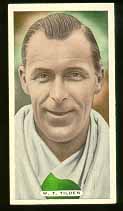
Cigarette card dating from around 1935 |
"Big Bill"
|
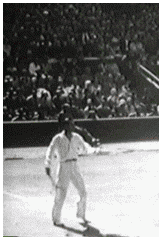 |
To
talk about "Big Bill" Tilden is to talk about a legend amongst legends.
His story is as complete a narrative of the sport of tennis as one could
possibly imagine passing from talent to drama, from commitment and passion
to personality and even politics. "Big Bill" makes almost all "the others"
seem small in his wake!
William Tilden was not only a talented player. He combined a profound artistry for the game with the skills of a shakesperean actor where-in his "play" provided him with a means of expressing his innately creative nature and strong personality to the public. |
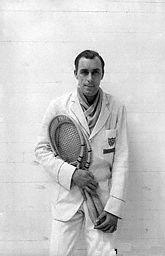 |
| The early years |
|
Big Bill |
|
|
|
|
|
|
|
|
| Having
learnt the essential skills of tennis during the years of the First World
War, he initially saw success in mixed doubles at the age of 20 in the
American Championships. In 1918, he went on to win the mens doubles title
with a young 15 year old called Vincent
Richards. It was from here-on in that Bill was to recognise in himself
his strong taste for young boys, a taste that regularly manifested itself
in the choice of doubles partners that he would impose on the American
Tennis Association whilst on tour. Vincent Richard's talent could not be
questionned, but this was not always the case with the other young partners
he would choose, often directly in conflict with his selectors...
In 1919, Tilden was 26 years old when he lost the mens singles final at the American Championships in only three sets to William Johnston. Feeling humiliated, he withdrew for the whole of the ensuing winter period to the home of a rich insurance broker from Newport who had one of the few covered courts that existing in the USA. In exchange for lessons for the man's son, he was able to use the covered court as he pleased in order to work on his own game. He dedicated himself to forging a new backhand and improved grip. As spring was breaking, he left the insurance broker's home having developed a backhand that was as quick and positive as his forehand and a service rated at more than 180 km/h, Tilden was at last ready to assert himself at ther very top level. |
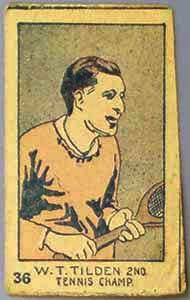
a cigarette card of 1920 |
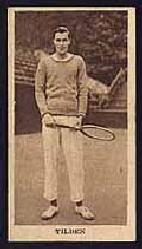 |
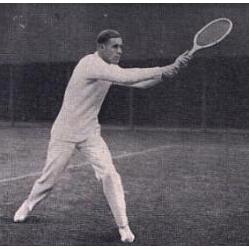 |
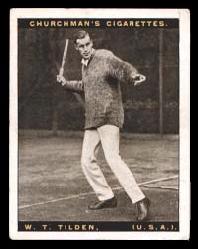 |
|
|
|
Having become the world's number one at the end of 1920, he immediately started what was to be a long running dispute with the American selectors by imposing personal conditions for his going on tour. He would insist, without the slightest compromise, on staying in expensive hotels and travelling only with the partners of his own choice. During his second trip to Europe, he took with him as his doubles partner a handsome young man called Jones. The Frenchman Pierre Albarran relates in his "History of Tennis" : "You should have seen him during the World Championships of 1921 at Saint-Cloud, playing in the mens doubles with a charming seventeen year old boy called A.W.Jones that he would relegate to one corner of the tennis court with strict instructions not to move, whilst on his own facing such powerful opponents as the Spanish combination of Alonso-Gomar or the French Gobert-Laurentz? Who-so-ever saw the prodigious battles undertaken by Tilden on these two occasions can only, despite all of the gossip, respect the truely formidable class that expodes from within this man! " |
| This website strongly considers that 1921 should be recognised as the year of the very first true Grand Slam in history. This was an era when no American or European would think of travelling specifically to Australia to contest a tournament. The Davis Cup had in any case been played out in Aukland, New Zealand under title of Australasia. It then would have entailed far too much additional travel to exit the southern hemishere via Australia before returning home. This was therefore the year that Bill effectively won all of the three recognised great championships in the world in the same year i.e. Paris, London and New-York. He didn't make anything special out of it since for him the Davis Cup was by far the most prestigious trophy of all. He would go on to defend it victoriously in each of the following six years. He even delayed his progression to the professional circuit until 1930 in an attempt to recapture the title for the USA. The journalist Frank Deford would later write: "Tilden played for himself, for his country and for posterity. In the eyes of the American people he was the reincarnation of tennis itself!" | Les américains à Wimbledon, 1920. A gauche, Tilden, à droite, Johnston. |
| Content
with his success in the world championships in both London and Paris of
1921, Bill stayed in America over the following years to consacrate himself
to defending the Davis Cup and advancing his career as an artist.
He wasn't in any case particularly interested in making the long trip back
to Europe simply to win these championships again as odds on favourite.
America dispatched its second tier of defence and, as it happened, they
each returned with very similar success:
Johnston
in 1923, and Vincent Richards
to the
olympic games in 1924...
Tilden could sleep peacefully at night!
During this period of total invincibility and with more than 6 consecutive titles at Forest Hills, Tilden also won the American Clay Court Championships 7 times and the Indoor Championships 4 times. He won 4 doubles titles at Forest Hills and 13 consecutive matches in the Davis Cup! By 1923, he had not lost a single match. In 1925, il played 57 games in a row without losing any of them! One day he modestly declared: "When I miss the ball, I am surprised!" |
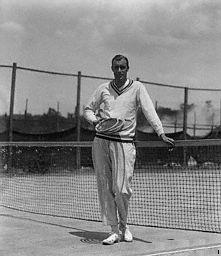
Tilden en 1926 |
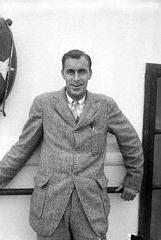
Tilden in 1926 |
By
staying in America, Tilden made sure that he could dedicate as much of
his time as possible to his perceived vocation as an artist. He wrote theatrical
plays for Broadway and was even known to act himself, but all with very
mediocre success. He was almost certainly a better actor than writer given
his obvious and renowned theatrical talent on the tennis court! He
would be seen to take four balls in his left hand, to serve three aces
in a row but then to leave the court in disgust if he missed the fourth
one!! He was known to cede an entire set to his opponent in order to make
up for a poor decision by the referee in his favour!
His greatest pleasure was to crush opponents by playing them at their own game! This was by far the best way of showing his superiority: in Paris in 1921, against the Rumanian Mishu, he made it a matter of honour to win whilst imitating all of his opponents strokes, returning a drive with a drive, a slice with a slice, dropball for dropball and even copying Mishu's curious spoon-like service... Tilden was quite simply a master at all aspects of the game! |
| As an artist, Bill's greatest
passion was the opera. Sadly however he had to recognise even to himself
that his voice didn't cut the mustard! He therefore satisfied this craving
to the very end by collecting records and singing in the bath!
|
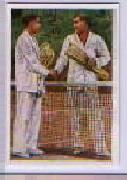
Lacoste and Tilden |
In 1926, he met the French for the second time in the challenge round of the Davis Cup. In what was the fifth match, with the Americans already leading 4/0, a very tired Tilden came up against a Monsieur Lacoste who was was in full ascendency. The Frenchman dominated with relentless consistency and precision to win in four sets. This was the first time that Tilden had lost at singles in 6 years! The psychological effect on the French of gaining this victory was enormous: at last the tirant had been shown to have his weaknesses, he would no longer be invincible and one would wait to see what happened next... |
| One week later at Forest Hills, Tilden lost in the quater finals, this time in five sets but against another Frenchman calledHenri Cochet. Big Bill was thirty three years old. He was at an age where defeat by opponents that were ten years his junior should normally have provoked either thoughts of retirement or cutting his losses and turning to a professional career. He wouldn't have any of it. Big Bill turned down an offer of 50.000$ to go professional and could only concentrate on the Davis Cup. He decided to make a pilgrimage to Europe in the spring of 1927 in order to confront on their own turf the French players who now looked so well placed to tear away his coveted trophy! At last reconciled with the American Association, he chose Frank Hunter as his travelling companion and doubles partner. His primary objective was to win back the European titles that he had conquered back in 1921. | 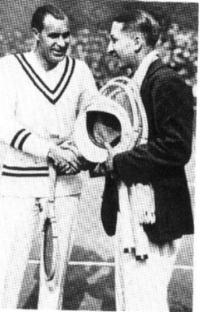
Tilden acknowledging Lacoste as the victor in Paris, 1927 |
| Bill would come
so close in many ways to achieving what he set out to do but ultimately
he was to fail. 1927 ended up a disastrous year. In Paris, he beat Cochet
in straight sets before going on to lose against Lacoste in the final.
He lost after four hours of play and having stood at 2 match points in
the fifth set! At Wimbledon, he was leading Cochet 6/2 6/2 5/1 and 30/0
on his own service when... Cochet made a miraculous recovery and won seventeen
points in a row! Cochet went on to win the last three sets and the match
7/5 6/3 6/2. Tilden's only consolation was to win in the mens doubles with
Hunter over Cochet-Brugnon
in a five set thriller, having saved one match point against them... what
would one give to have been at those matches?
The lost of the Davis cup in September 1927 is probably one of the saddest days of Bill's life. He was majestic against Cochet in the singles and then again in the doubles with Hunter, but he tired quickly in the third day's play against Lacoste and watched on powerlessly as Johnston went down decisively against Cochet. What could be more cruel than to then play in the mens final at Forest Hills and lose in straight sets to a rampant Lacoste? |
Three
cigarette card images:
|
|
|
| Despite
all these problems, Big Bill again made the trip to Europe three years
later in the hope of bringing back the coveted Davis Cup trophy. He was
not to prove successful. He may have beaten Lacoste at their meeting of
1928, but he was from there-on in crushed by Cochet three years in a row,
hence losing all hope of revenge.
Tilden was eventually to leave amateur tennis in 1930 on a high note however. At thirty seven years old he regained the position of champion at both Forest Hills and Wimbledon. His only great regret was that he had not been able to overcome the two only players to have ever beaten him: Lacoste et Cochet. In fact, the French didn't go to Forest Hills in 1929 when Tilden crushed everyone before him. At Wimbledon in 1930 the opposition was also weakened by the absence of Lacoste through injury and Cochet being beaten in the early rounds by Allison. Tilden did stage a last reminiscent semi-final against Borotra, winning in 5 sets 0-6, 6-4, 4-6, 6-0, 7-5. He refound his theatrical side by countering the renowned volleyer with his own strokes and playing only one lobby during the entire encounter! The final against Allison was a relative formality... Tilden, champion of Wimbledon some ten years after his first success was, without any doubt, a quite exceptional player. For the rest of his life however he would carry with him the memories of Lacoste et Cochet, who he had met on his long travelled tennis career and who were the only two players in the world to have ever beaten him! |
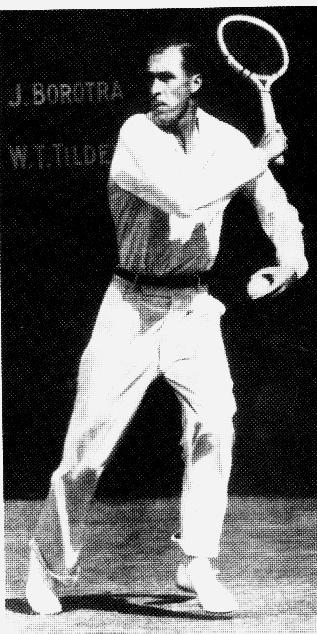
Tilden in 1930 at Wilmbledon |
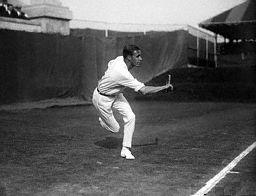 |
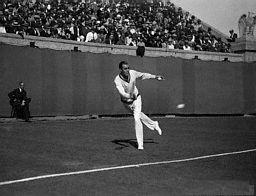 |
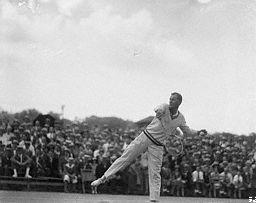 |
| "Tall
and athletic with shoulders as broad as a horse, he had exceptional reach
and a speed of response that enabled him to return practically any shot
you could throw at him. He could cross the court in three strides at speed
and still find the perfect equilibrium to strike the ball faultlessly."
(History
of Tennis, Henri Cochet and Pierre
Albarran)
Technically, he could do practically anything. It was tactically that he specifically distinguished himself from his contemporaries however. Tilden would play as much for the public as for himself. He had a remarkable intelligence for the game, never playing twice the same stroke. Indeed, he would study his opponent's play, copying his strokes, standing on the base line and playing the ball late putting strange trajectories and a surprising turn of speed on the ball such as to totally disorientate his adversary ... Easy victories did not interest him such that he always had to add a touch of comedy or of the spectactular to all of his matches. |
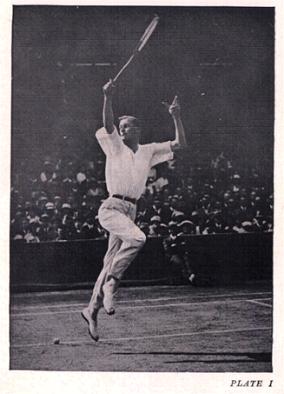 |
| Throughout his amateur career, Tilden sought to evolve his game, always learning something from any defeat. In 1930, at over 37 years old, he would still arrive in Paris announcing that he had invented a new stroke to outwit Monsieur Cochet ! |
Just like all the champions
of today, Tilden would supplement his income through advertising. His name
would appear on everything from rackets,
balls
can...to mens underclothing, this was perfectly acceptable at
the time. It is as a true actor that he vaunts the inimitable taste of
Lucky Strike cigarettes in the 1928 advertisement: admire this extraordinary
ad
where Tilden exhales clearly with little effect to his throat since he
is smoking on stage! .
|
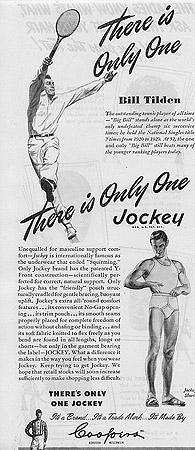
1946 : Mens underclothes |
| Wildly under rated as a playwrite and author, Tilden had much more success in producing books on the techniqes and tactics of tennis. One might even suggest that he was the first intellectual of the sport since he blended technical aspects of the game with it's psychological elements and it's physical or ballistic components! |
|
||
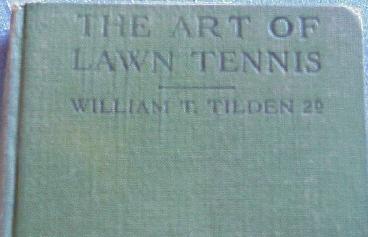 |
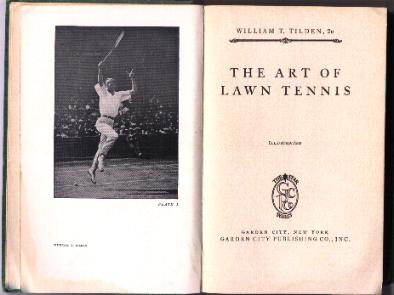 |
||
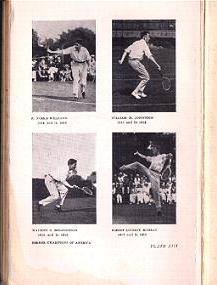 |
|
| As
Tilden grew older and the quality of his game dropped, he made far less
effort to hide his homosexuality. His travels with young men, all of whom
were good looking and who he referred to as his "pupils", started to shock
middle America. He was progressively excluded from recognised tennis circles
both in both the USA and overseas...
After the war, in what was an era of strong conservatism tainted by a level of intolerance through Maccartysm, Tilden fell into problems with the American justice system. He was accused of having made illicit and improper advances to young adolescents and undertook two successive spells in prison. Had Tilden lived today things might well have turned out completely differently of course. With such a strong personnality, he could have become a star such as a television presentator, film actor or something similar. As it was he finished his life rather miserably. Still making a living from tennis lessons at the age of 60, Big Bill died on the 5th June 1953 of a brain hemorrage. He was found in his hotel bedroom with 282.11$ in his pocket. This was all he had left... Despite the sad ending to
this glorious tennis career, Tilden remains a hero in the hearts of many
Americans. Only six weeks after having got out of prison, he was voted
as the Best Tennis Player of the Century. Even today, whilst his memory
is understandably tainted by those events towards the end of his life,
he must still be recognised as one of a very small band of sportmen, and
in particular tennismen, to have combined such strong personnality with
unmatchable skill.
|
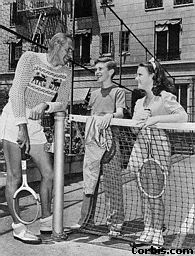
Coach Tilden in 1944. A rare photo found of him in shorts!
|
His successes in the Grand Slam events are summarised below : 11 mens singles, 6 mens doubles and 5 mixed doubles.
| Wimbledon | Mens Singles (3) | 1921-22
1930 |
| Mens Doubles (1) | 1927 F.Hunter | |
| American Championships | Mens Singles (7) | 1920-21-22-23-24-25
1929 |
| Mens Doubles (5) | 1918
V.Richards
1921 V.Richards 1922 V.Richards 1923 B.Norton 1927 F.Hunter |
|
| Mixed Doubles (4) | 1913 M.K.Browne
1914 M.K.Browne 1922 M.K.Browne 1923 M.B.Mallory |
|
| Roland-Garros | Mixed Doubles (1) | 1930 C.Aussem |
| Davis Cup (7) | 1920-1926 | |
| Championnats du monde sur terre battue | Mens Singles (1) | 1921 |
Des idées, des remarques, des suggestions? E-mail
E-mail
Dernière mise à jour : 30
avril 2010
Copyright BLANCHE NET communications.
Avril 2010.
.